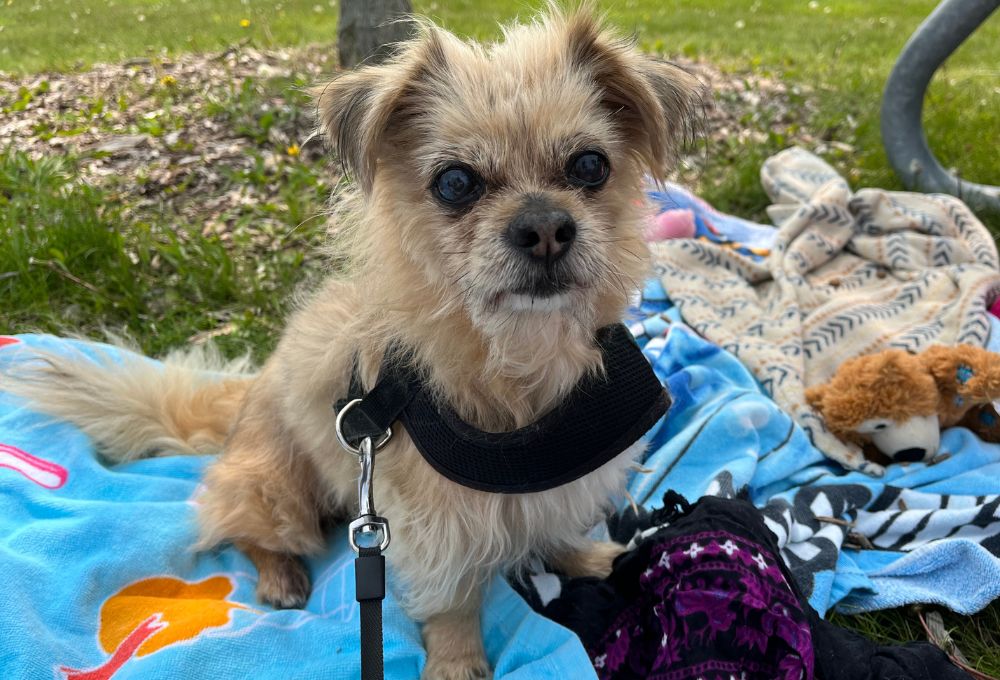
It is normal that your dog experiences a small amount of weight loss as they age. This can happen due to a slight decrease in muscle mass, subtle changes in metabolism, and less appetite. However, if your dog has rapid loss of weight for no apparent reason you want to rule out any potential health condition.
This article explores the reasons behind this phenomenon and provides insights into how to address the issue. We will delve into various factors that could contribute to weight loss in senior dogs and offer helpful suggestions for maintaining a healthy weight.
What is your Senior Dog’s Ideal Weight?
The ideal weight for your dog depends on various factors, including their breed, size, and overall body condition. A general guideline is to focus on your dog’s body condition instead. A healthy weight should look like a visible tuck at the waist and you should be able to feel but not see the ribs. Pay attention if the bones around the ribs, pelvis, and spine are becoming more visible.
Common Causes of Weight Loss in Senior Dogs
Dental Issues and Oral Health
Missing teeth, gum disease, or oral infections can cause pain and discomfort leading to a decreased appetite and subsequent weight loss. Sometimes the decreased appetite goes unnoticed because your dog can be hiding the food or spitting out their kibble.
Make sure to brush their teeth regularly, provide dental treats or toys, and schedule professional cleanings as recommended by your veterinarian.
Digestive Problems
Digestive issues such as Inflammatory bowel disease is common. This condition affects the absorption of nutrients from their food, resulting in weight loss. Prioritize easily digestible meals and incorporate dietary fiber to help support their digestive system.
If you notice any signs of gastrointestinal distress, such as vomiting, diarrhea, or excessive gas, consult your veterinarian. They can recommend appropriate dietary adjustments or further diagnostic tests if necessary.
Chronic Illnesses and Diseases
Medical conditions such as kidney disease, liver problems, thyroid imbalances, or cancer can contribute to weight loss in senior dogs. These conditions often require veterinary intervention and specialized treatment plans to manage weight loss effectively. This may include medication, dietary modifications, or additional supportive care to address their specific condition.
How to Get Your Senior Dog to Gain Weight
Here are some key considerations to provide them with proper nutrition and help them gain weight:
High-Quality Senior Dog Food
Opt for high-quality senior dog food that is specifically formulated to meet their nutritional needs. These diets are often lower in calories and contain essential nutrients to support their overall health. Avoid feeding them with foods that are high-fat content as it can lead to pancreas inflammation.
Feeding Schedule and Portion Control
Establish a regular feeding schedule and practice portion control to ensure your senior dog receives adequate nutrition without overeating. Dividing their daily food allowance into smaller, more frequent meals can help stimulate their appetite and promote weight maintenance.
Nutritional Supplements
Consult your veterinarian about incorporating nutritional supplements into your senior dog’s diet. Supplements like omega-3 fatty acids, glucosamine, and chondroitin can support joint health and overall well-being.
Consider Wet Food
Mixing their kibble with wet food can be a good idea not only because it adds extra flavor but also makes it easier to chew. Your dog will really appreciate it especially if they have dental issues.
Regular Veterinary Check-ups
Schedule regular check-ups with your veterinarian to monitor your senior dog’s overall health. Routine examinations can help detect any underlying medical conditions early on and allow for prompt treatment, preventing further weight loss.
Provide a Stress-Free Environment
Stress can impact a dog’s appetite and overall well-being. Ensure your senior dog has a calm and comfortable environment, free from excessive noise or disruptions. Create a designated resting area where they can relax and feel secure.
Keep Them Physically Active
Regular exercise is essential for maintaining muscle mass and overall health in senior dogs. Adjust their activity level according to their abilities, and engage in low-impact activities such as leisurely walks or gentle play sessions.
Emotional Well-being of Senior Dogs
Senior dogs thrive on love and attention. Provide them with mental stimulation, affection, and companionship to promote their emotional well-being. Spending quality time together can also help stimulate their appetite and prevent weight loss.
Conclusion
Weight loss in senior dogs despite a healthy appetite can be concerning. Understanding the various factors that can contribute to this issue is essential in addressing it effectively. By providing proper nutrition, dental care, regular veterinary check-ups, and managing any underlying illnesses you can help your senior dog maintain a healthy weight and enjoy a high quality of life in their golden years.
FAQs
Senior dogs can experience weight loss due to various factors such as dental issues, digestive problems, metabolic changes, or underlying illnesses. It’s important to consult with a veterinarian to determine the underlying cause and develop an appropriate treatment plan.
Consulting with a veterinarian is recommended before making any significant dietary changes. They can assess your dog’s overall health and recommend a suitable diet that meets their specific needs.
Yes, stress can affect a dog’s appetite and contribute to weight loss. Providing a calm and stress-free environment is important for their well-being.
If your senior dog is experiencing significant or unexplained weight loss, it’s advisable to seek veterinary attention promptly. A thorough examination can help identify any underlying medical conditions.
Working with your veterinarian, you can develop a plan to address weight loss and help your senior dog gain weight in a healthy manner. This may include adjusting their diet, incorporating nutritional supplements, and managing any underlying health issues.
Recent Posts:
- Is the Dogo App Worth It? Honest Review After Training My Dog
- Amazon’s Top Black Friday and Cyber Monday Deals for 2024: Dog Products Edition
- Top Pet Trackers for Sending Your Dog with a Pet Sitter
- Should Dogs Wear Bells?
- Which Dog Breed Has the Longest Lifespan?
Recent Posts
Is the Dogo App Worth It? Honest Review After Training My Dog
Training your dog shouldn’t feel like another chore, but it often does because, unless you’re a professional trainer, you have to research everything yourself first. And that research can take...
Amazon's Top Black Friday and Cyber Monday Deals for 2024: Dog Products Edition
The holiday shopping season has officially started and Amazon has already released some incredible deals on pet products for Black Friday and Cyber Monday 2024. Here is our curated list of the...
